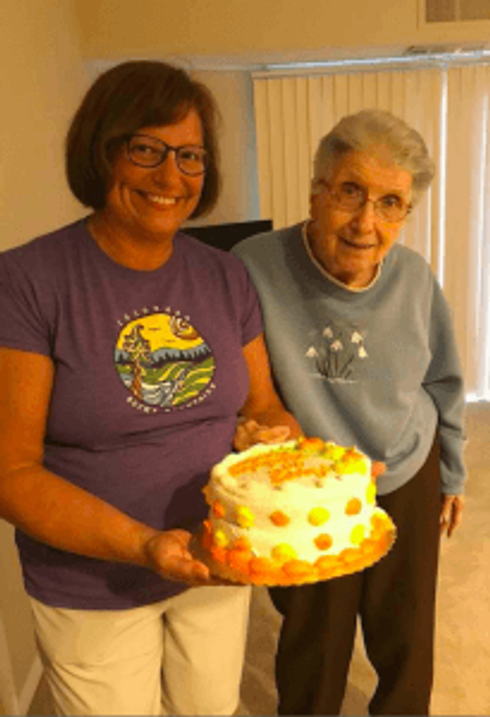Getting a Parent With Dementia the Best Long-Term Care for the Money
A new study finds that providing life stories can lead to better, person-centered care
Liz Kozlowski and her staff at Brookdale Senior Living’s Westlake Village, outside of Cleveland, knew that resident Ed Petrigac and his wife Yvonne had started an auto parts business. But it wasn’t until they read his life story that they realized he also had a love of cars. That knowledge helped the staff provide better, more patient-centered care for Petrigac, a Korean War veteran who lived in the facility’s memory-care unit.


And, based on a recent independent study conducted through a grant for my firm, MemoryWell, familiarizing professional caregivers with residents’ life stories can be impactful for the people with dementia in long-term care — and their families.
Considering that the median cost of a private room in a nursing home is now roughly $100,000 a year, according to Genworth Financial, person-centered care has become essential to ensure your loved one gets the best long-term care for the money. Families want to be assured their loved ones in memory-care communities are known and treated like the person they know and love.
A Trip to the National Car Show
In Petrigac’s case, Brookdale’s staff read the story of his life that had been provided for them digitally by a professional writer. In it, they learned that Petrigac and his son, Mark, had spent three years fixing up a 1965 GTO when Mark was in high school. The revelation led to a trip with Westlake staffers to the National Car Show in Cleveland, followed by pizza — an enjoyable outing for Petrigac, who by that point spent most of his time in Westlake's memory care wing.
In surveys administered three and six months after the stories were written and shared, 83% and 90% of care workers respectively reported the life stories benefited them in their work.
“He had a great day,” recalls Kozlowski, Clare Bridge programs manager at Westlake Village, which piloted a life story telling platform last year as part of a grant from the International Women’s Media Foundation, funded by Howard Buffett for women journalists doing innovative work. In the study, writers turned their news-gathering talents on Westlake’s residents to help staff more readily know their residents.
“We learned about certain quirks or things people really enjoyed,” Kozlowski says.
The staff assumed one prim-and-proper resident had been exaggerating when she described being a pilot previously. They were surprised to read in her story that she really had been one, for many years.
What the Study of Residents With Dementia Revealed
The study offered preliminary substantiation that a digitally shared narrative approach can assist in providing person-centered care for people with dementia, replacing handwritten questionnaires that are sometimes illegible and can be hard to access by staff.
Person-centered care was developed in the late 1980s by U.K. social psychologist Tom Kitwood and has become the standard of care for people with dementia. The Alzheimer's Association endorsed it as the foundation of its 2018 Dementia Care Practice Recommendations. Until recently, little research had been done in the U.S about the usefulness of life story telling for caregiving. But U.K. and Canadian studies have shown that it builds empathy for paid caregivers and family caregivers and can also help reduce depression and improve quality of life.
In the Westlake study, about half of the facility’s residents (16 people) had their stories told by MemoryWell. Then, the Gilster Group, an independent research group in Ohio, studied the impact of those stories on many of the 25 front-line staff workers over six months.
In surveys administered three and six months after the stories were written and shared, 83% and 90% of care workers respectively reported the life stories benefited them in their work.
The researchers found that, over the course of the study, paid caregivers increasingly accessed the digital platform hosting the stories and allowing families to add photos, music and movies and staff to search them. The proportion of staff who reported referring to the stories “frequently” jumped from 9% to 31% between three and six months and those who reported referring to the stories “periodically” increased from 18% to 38%.
The Key for Caregivers: Getting to Know You

Feedback from the care staff also showed the appeal of a life story telling platform that lets them add new details over time. So, for example, being able to update the residents’ changing food preferences such as from chocolate ice cream to vanilla. “People change and you need to know who they are now,” one West Lake caregiver told researchers.
Getting to know the details of someone’s life sometimes improved staff’s engagement with the person, too.
For example, the caregivers initially only knew that Maxine H. had worked for a railroad company. But they learned in her story that she also had loved spending her downtime in Cleveland’s Tower City District. So, as part of a Westlake activity that lets residents explore local towns virtually, when Maxine is present, the staff makes sure to “visit” that district.
The stories “give me a sense of comfort knowing I am providing the best personal care I can based off the resident’s needs,” one Westlake staffer told researchers.
Answering More Questions About Person-Centered Care
Can a better understanding of residents’ histories, likes and dislikes reduce the overreliance of psychotropic medications in long-term care facilities for people with dementia who become agitated or aggressive? And, can tools for understanding and relating to difficult residents help professional caregivers find more job satisfaction, so they’ll stay in their jobs longer?
To help answer these and other questions, MemoryWell has applied for a small business innovation research grant from the National Institute on Aging to conduct some of the first U.S.-based research on a much larger scale.

